After 43 days, the longest government shutdown in U.S. history has finally come to an end. Federal workers will begin receiving pay again, national parks will reopen, and stalled government services will resume. Yet, after all the political chaos, many are questioning what Democrats gained from the standoff.
The shutdown began after Senate Democrats used a filibuster to block a Republican funding bill, demanding an extension of health insurance subsidies for low-income Americans. However, when a small group of Democrats voted to reopen the government, they received little in return only a vague promise of a future vote on the subsidies, with no guarantees of support from House Republicans.
This outcome has left Democrats deeply divided. The party’s progressive wing accused Senate Majority Leader Chuck Schumer of caving under pressure, while others branded the compromise a “surrender.” California Governor Gavin Newsom, a potential 2028 presidential contender, called the deal “pathetic,” criticizing Democrats for “playing by the old rules” in a political era defined by Donald Trump’s dominance.
For Trump, the shutdown’s end marked a political win. He hailed the reopening as a “very big victory,” boasting that Democrats failed to break Republican unity. Despite temporary dips in his approval ratings, Trump remains confident, facing no future elections himself.
Still, unresolved issues loom. Congress must pass additional funding bills by January to prevent another shutdown, and millions of Americans could see health insurance costs soar if subsidies expire.
Complicating matters further, the political spotlight shifted abruptly when Congress forced a vote to release Justice Department files on the late Jeffrey Epstein, overshadowing Trump’s supposed victory.
As the dust settles, Democrats are left nursing political wounds and reassessing their strategy—while Republicans, for now, savor the upper hand.

